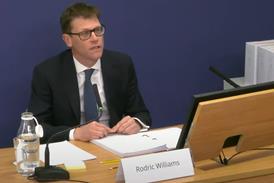Defendant solicitors on the losing side in this week’s Supreme Court costs judgment have said the rules need urgently reviewing in response.
Judges unanimously agreed that the defendant in Adelekun v Ho could not set off their own costs against the claimant costs under the qualified one-way costs shifting scheme.
Effectively the ruling means Ho must pay Adelekun the full pre-settlement costs of £16,700 but cannot enforce their own Court of Appeal costs order for £48,600. Lord Briggs and Lady Arden acknowledged the conclusion might appear counterintuitive and unfair, but the QOCS scheme in its current form was the best solution for claimant solicitors and defendant insurers.
Matthew Hoe, director of litigation and dispute resolution at Taylor Rose MW, who acted for the defendant, said the outcome was ‘alarming’ and severely restricted the court’s ability to make a claimant pay a successful defendant’s costs.
‘Reaching the decision by focusing only on the words of the QOCS rules and not wider usages in the CPR will make the outcome of future cases about the CPR harder to predict,’ said Hoe. ‘Concerningly, it paves the way for claimants pursuing bad points – as the claimant had originally done in Adelekun – forcing defendants to incur costs the claimant will not have to pay, perhaps thereby applying improper pressure to settle. An urgent review of the QOCS rules by the CPRC is required to ensure the intended checks and balances operate.’

Hoe, a member of the Forum of Insurance Lawyers’ costs focus team, said it was difficult to see why damages in orders could be enforced against defendants’ costs but damages from settlements should be kept safe.
‘There is no real difference between the two, and distinctions like this encourage parties to play games to get their preferred results. The CPRC should review the QOCS rules again.’
Before the Supreme Court, the defendant urged judges not to give a green light to the pursuit by claimants of weak interim applications and unmeritorious points, arguing as well that upholding the appeal would remove any real incentive to settle before trial.
Jonathan Tetley, partner at defendant firm Plexus Law, said: ‘This will make cases more difficult to settle for defendants and their insurers by removing some of the teeth from their Part 36 offers and result in their having to pay out more in costs to claimants in cases involving late acceptance of Part 36 offers.’

















![David Lester (senior partner at Blythe Liggins), Darryl Barnes, Jagdeep Sandher (head of dispute resolution at Blythe Liggins)[4]](https://d1d8vslyhr7rdg.cloudfront.net/Pictures/274x183/4/2/8/116428_davidlesterseniorpartneratblytheligginsdarrylbarnesjagdeepsandherheadofdisputeresolutionatblytheliggins4_981603_crop.jpg)






16 Readers' comments